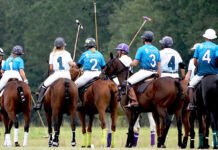As a youngster in Point Clear, it never crossed my mind that hurricanes weren’t something that everyone in the world dealt with. I was not yet thinking of bad weather as an isolated event; to me, rain and wind were turned on and off for everyone at the same time.
Like Columbus, studying ships as they fell below the horizon, I eventually noted how the storms traveled across the Bay. I watched the wall of rain sweep over Julep Point and march across the water until I was running up the wharf with the cypress planks spotting at my heels.
Until I was 9 years old, hurricanes were fun. School was canceled, and nothing ever seemed to happen except for a little strong wind and rain. Then, I experienced Hurricane Frederic.
My siblings and I spent a long, boring morning watching Mom pack our clothes and food while Dad hurried around outside, bringing furniture off the wharf and nailing boards over the windows. That afternoon, he sent us ahead to stay with friends in Stockton. He remained to finish boarding the windows and assured us he would be along later in the evening. He tells me, all these years later, that afternoon was the only time he’s ever felt he was in the midst of true evil.
After we left, Dad continued nailing plywood over the front windows. In Point Clear, most people call the yard nearest the water the front, even though that’s not where the cars and the main entrance are. Also important to note is that the houses are close together where we lived, forming a wall between the Bay and the back highway. In winter, the north wind can be howling at the front windows while the highway is still and peaceful. By late afternoon, the sky was dark and the storm surge already had the water lapping at the top of the bulkhead. He heard the wind in the tops of the pines, and looking out past the end of the wharf, he noticed waves white-capping far offshore. But it was calm where he was, and rain was barely falling. He had a couple more windows to go.
Dad finally finished and hurried into the house to grab his suitcase. Once inside, he noticed the back windows closest to the highway were shaking and plastered with wet pine straw and leaves. He opened the back door and windblown rain hit him like lead shot. He claims it was like stepping into another world.
A hurricane resembles a giant circular saw blade rotating counter-clockwise. As Frederic made landfall at Dauphin Island, its wind came from the east, the top of the saw blade hitting the backs of the houses in Point Clear and diverting over their roofs to stroke the water again far offshore.
Shielded from the strengthening storm all the while he’d been working in the front yard, Dad had been tricked into a false sense of safety.
Now, he discovered that Frederic was directly over him.
He made his way to the car and pulled out onto the deserted highway. As he drove up the road, he felt the wind rocking the car as the wipers whipped at the swirling sticks and leaves. When he got to County Road 32 and turned east, he watched in his rearview mirror as telephone poles snapped and fell into the road behind him, sparks flickering white and blue and orange through the rain-blurred night. He even had to navigate around a few that fell in front of him.
“It was like the Devil was after me, ” he says with solemnity.
Dad eventually made it to us in Stockton. And he didn’t tell me that story until recently when I asked him what he remembered of Frederic. He felt foolish then and still does now for not seeing it coming.
Even in Stockton, we didn’t escape the wrath of Frederic. When we woke the next morning, it looked as if a bomb had gone off outside. Days passed before the roads were cleared and we were able to make our way south again. When we finally got home, I didn’t see a single pine tree standing in the yard. I thought it looked as though a giant had crushed them beneath his feet like blades of grass. Pieces of people’s houses and docks were wedged into the debris. It didn’t seem possible to clean it all up.
I slept in my room that night with a pine limb that had punched through the roof hanging over my bed. We went 10 days without power. Since the electric pump on the well wouldn’t work, Mom boiled water from the Bay to use for washing. We had clean drinking water in the bathtub that Dad had filled before we left. Our meals were limited to powdered milk and canned food. But I was just a kid, and some of this seemed like an adventure to me.
In the days following, Dad worked on clearing the trees. My siblings and I shoveled mud and sand out of the yard in hopes that a little of the St. Augustine grass smothered beneath would survive. For months afterward, the crisp fall and winter air was filled with the sound of chainsaws and trucks. The smell of briny Bay water, diesel and two-cycle oil permeated the entire area. And slowly, like a place swarmed with worker ants, the trash disappeared and our house stood in a leafless land of brown, not to be green again
until spring.
Though I wouldn’t trade my life on the Gulf Coast for anything, the sound of chainsaws in the cool fall air never ceases to remind me of what a precarious foothold we have on Mobile Bay.
Hurricanes are simply a part of life on Mobile Bay. Click here to read about the Gulf Coast’s fifth season: the “Hurricane Summer.”
Text by watt key





